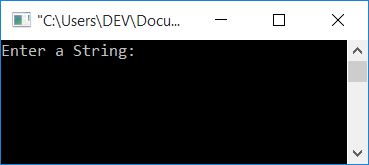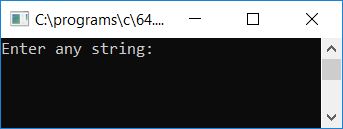- C Programming Examples
- C Programming Examples
- C Print Hello World
- C Get Input from User
- C Print Integer
- C Add Two Numbers
- C Add Subtract Multiply Divide
- C Add n Numbers
- C Area Perimeter of Square
- C Area Perimeter of Rectangle
- C Area Circum of Circle
- C Fahrenheit to Celsius
- C Celsius to Fahrenheit
- C Inches to Centimeters
- C Kilogram to Gram
- C Reverse a Number
- C Swap Two Numbers
- C Interchange Numbers
- C Print ASCII Value
- C Print Fibonacci Series
- C Check Palindrome or Not
- C Check Armstrong or Not
- C Find Armstrong Numbers
- C Find nCr and nPr
- C Find Profit Loss
- C Sum of their Square
- C First & Last Digit Sum
- C Sum of All Digit
- C Product of All Digit
- C Print Total Digit in Number
- C Check Perfect Number
- C Find Basic Gross Salary
- C Round Number to Integer
- C Print Series upto n Term
- C Find Factors of Number
- C if-else & Loop Programs
- C Check Even or Odd
- C Check Prime or Not
- C Check Alphabet or Not
- C Check Vowel or Not
- C Check Leap Year or Not
- C Is Reverse Equal Original
- C Make Calculator
- C Add Digits of Number
- Count Positive Negative Zero
- C Largest of Two Numbers
- C Largest of Three Numbers
- C Smallest of Two Numbers
- C Smallest of Three Numbers
- C Find Factorial of Number
- C Find LCM & HCF
- C Find LCM of n Numbers
- C Find HCF of n Numbers
- C Find Arithmetic Mean
- C Find Average, Percentage
- C Find Student Grade
- C Print Table of Number
- C Print Prime Numbers
- C Find Discount Purchase
- C Calculate Parcel Charge
- C Calculate Wage of Labor
- C Print Phone Bill
- C Conversion programs
- C Decimal to Binary
- C Decimal to Octal
- C Decimal to Hexadecimal
- C Binary to Decimal
- C Binary to Octal
- C Binary to Hexadecimal
- C Octal to Decimal
- C Octal to Binary
- C Octal to Hexadecimal
- C Hexadecimal to Decimal
- C Hexadecimal to Binary
- C Hexadecimal to Octal
- C Pattern Programs
- C Pattern Printing Programs
- C Print Diamond Pattern
- C Print Floyd's Triangle
- C Print Pascal's Triangle
- C Array Programs
- C 1D Array Programs
- C Linear Search
- C Binary Search
- C Largest Element in Array
- C Smallest Element in Array
- C Second Largest/Smallest
- C Count Even Odd
- C Array Element at Even
- C Array Element at Odd
- C Print Even Array Elements
- C Print Odd Array Elements
- C Sum/Product of Even/Odd
- C Reverse an Array
- C Insert Element in Array
- C Delete Element from Array
- C Merge Two Arrays
- C Bubble Sort
- C Selection Sort
- C Insertion Sort
- C Print Common Elements
- C 2D Array Programs
- C Add Two Matrices
- C Subtract Two Matrices
- C Transpose a Matrix
- C Multiply Two Matrices
- C Sum All Matrix Elements
- C Largest Element in Matrix
- C Print Row Column Total
- C 3D Array Programs
- C String Programs
- C Print String
- C Find Length of String
- C Compare Two String
- C Copy a String
- C Concatenate String
- C Reverse a String
- C Count Vowels Consonants
- C Replace Vowel in String
- C Delete Vowels from String
- C Delete Word from String
- C Frequency of Character
- C Count Word in String
- C Remove Spaces from String
- C Sort a String
- C Sort String in Alphabetical
- C Sort Words in Ascending
- C Sort Words in Descending
- C Uppercase to Lowercase
- C Lowercase to Uppercase
- C Swap Two Strings
- C Check Anagram or Not
- C Check Palindrome String
- C Print Number in Words
- C Print Successive Character
- C Character without Space
- C File Programs
- C Read a File
- C Write Content to File
- C Read & Display File
- C Copy a File
- C Merge Two Files
- C Reverse File
- C Count All Character in File
- C List Files in Directory
- C Encrypt & Decrypt a File
- C Delete a File
- C Misc Programs
- Generate Random Numbers
- C Print Date Time
- C Print Message with Time
- C Get IP Address
- C Print Smiling face
- C Pass Array to Function
- Add Two Numbers using Pointer
- C Address of Variable
- C Shutdown Computer
- C Programming Tutorial
- C Tutorial
C program to remove spaces from a given string
In this article, you will learn and get code to remove spaces from strings using a C program. Here is the list of programs available in this article:
- Remove all spaces from a string entered by the user.
- Remove only extra spaces from a string entered by the user.
The first program removes all the spaces from a given string in C. For example, if the given string is
Welcome To CodesCracker
Then the string after removing all the spaces will be:
WelcomeToCodesCracker
whereas the second program removes only extra spaces from the given string. For example, if the string entered by the user is:
this is codescracker
Then, after removing only extra spaces from this string, the new string will be:
this is codescracker
Remove all spaces from the string in C
To remove or delete spaces from a string in C programming, you have to ask the user to enter a string. Now start checking for spaces. If space gets found at any index, then just shift all the forward characters one index back, as shown in the program given below. The question is, "Write a program in C that removes all the spaces from a given string by the user at run-time." The answer to this question is given below:
#include<stdio.h> #include<conio.h> int main() { char str[50]; int i=0, j, chk; printf("Enter a String: "); gets(str); while(str[i]!='\0') { chk=0; if(str[i]==' ') { j=i; while(str[j-1]!='\0') { str[j] = str[j+1]; j++; } chk = 1; } if(chk==0) i++; } printf("\nString (without spaces): %s", str); getch(); return 0; }
This program was built and runs in the Code::Blocks IDE. Here is its sample run:

Now supply any string and press the ENTER key to see the same string without a space. Here is the second snapshot of the sample run:

Program Explained
Now let's discuss some of the main steps used in the above program with an example of the string shown in the previous sample run's snapshot:
- The string gets stored in the str variable in a way that
- str[0] holds W.
- str[1] holds e.
- str[2] holds l.
- and so on.
- Because there are spaces, they are at index numbers 7, 10, 11, 12, 13, and 14.So
- str[7], str[10], str[11], str[12], str[13], str[14] holds space.
- So when the value of i becomes 7, then the condition of the first if block evaluates to true. That is, space is discovered at the seventh index.
- So the value of i gets initialized to j, and the shifting of all forward characters (from where the space is found) to one index back gets performed.
Because the space is currently found at index number 7. So
- The character at index no. 8 moved to index no. 7.
- The character at index no. 9 moved to index no. 8.
- The character at index no. 10 moved to index no. 9.
- and so on.
- until the last character of the string.
- Because the value of i is 7 right now and the character was at index no.8, it gets moved back to index no. 7.
- Therefore, here the value of i does not get incremented because, for now, the character present at index no. 7 is unknown.
- That is, we have to check it, whether it is a character or a space.
- And if no space gets found at the current index, then just increment the value of i and check for characters present at the next index number.
- Continue the process until the last character.
Remove only extra spaces from a given string in C
Now this program only removes extra spaces from the string. That is, if there are two or more spaces available between any two words in the string, then after executing this program, there will only be one space left between all words.
#include<stdio.h> #include<string.h> #include<conio.h> int main() { char str[200]; int i, j, len; printf("Enter a String: "); gets(str); len = strlen(str); for(i=0; i<len; i++) { if(str[0]==' ') { for(i=0; i<(len-1); i++) str[i] = str[i+1]; str[i] = '\0'; len--; i = -1; continue; } if(str[i]==' ' && str[i+1]==' ') { for(j=i; j<(len-1); j++) { str[j] = str[j+1]; } str[j] = '\0'; len--; i--; } } printf("\nNew String = %s", str); getch(); return 0; }
Here is its sample run:

Let me create the same program once more with a different approach:
#include<stdio.h> #include<conio.h> #include<string.h> int main() { char str[100], ch, count=0, len, i, j, temp; printf("Enter any string: "); gets(str); len = strlen(str); for(i=0; i<len; i++) { if(str[i]==32 && str[i+1]==32) { temp = i; for(j=i; j<(len-1); j++) { str[j] = str[j+1]; } len--; str[len]='\0'; i = 0; } } printf("The new string after removing all extra spaces:\n"); puts(str); getch(); return 0; }
The above program was built and run in the Code::Blocks IDE, therefore here is the first snapshot of the sample run:

Provide any string with extra spaces and press the ENTER key to see the output as shown here in the second snapshot of the sample run:

Here are some of the main steps used in the above program:
- Receive any string using the gets() function inside any string variable, say str.
- Calculate the length of the string using the strlen() function and store it inside any variable, say len.
- Because indexing begins with 0, create a for loop that begins at 0 and ends at one less than the length of the string.
- Inside the for loop, check whether any character and its next character are equal to 32 or not. ASCII code 32 refers to space.
- If so, delete the next character (space) by placing each subsequent character next to the previous one.
- After removing space, reduce the string's length by one and, at the end, initialize a null-terminated character ('0') to inform the compiler that there are no more characters inside the string after that null-terminated character.
- Initialize the loop variable i with 0 and continue.
- After removing all spaces, print the value of the string as output; that will be the same string without extra spaces.
The same program in different languages
« Previous Program Next Program »